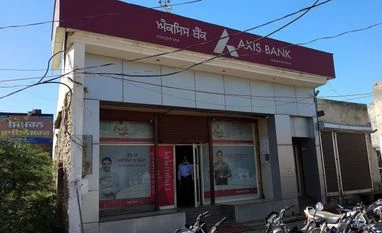Axis Bank reported a Rs 5,361 crore loss on a consolidated basis for the January-March period against a net profit of Rs 4,417 crore a year ago, impacted by the Rs 12,490 crore payout towards the Citi acquisition.
On a standalone basis, the third largest private sector lender reported a Rs 5,728 crore loss against a net profit of Rs 4,117 crore in the year-ago period, and Rs 5,853 crore in the preceding December quarter.
Its managing director and chief executive Amitabh Chaudhry told reporters that the impact of acquiring Citi's retail businesses is a one-time one, and if one were to exclude the same, the net profit would have grown by over 61 per cent on a year-on-year basis.
The bank's core net interest income grew 33 per cent to Rs 11,742 crore driven by a 0.73 per cent expansion in the net interest margin at 4.22 per cent and an over 20 per cent growth in advances. The other income grew 16 per cent to Rs 4,895 crore during the quarter.
Its chief financial officer Puneet Sharma said 41 per cent of the bank's overall loan book is linked to the repo rate, which got a margin benefit due to the hiking rates cycle, but added that there were other factors like the loan book composition and the deposit accretion 47 per cent of its base is the low cost current and savings accounts which helped the margins.
Its overall deposit growth came at 15 per cent for FY23.
Also Read
Sharma said that the bank has chosen to take the entire impact of the Citi acquisition, including the amortization for goodwill and other intangibles in this quarter itself, and added that the one-time hit also included the cost of harmonising of provisions because it is more conservative than the American lender.
At present, the loans from Citi constitute 3.5 per cent of the overall loan book for Axis Bank, and a relatively much higher benefit has come to the unsecured credit cards portfolio.
Chaudhry said the bank has seen a 4 per cent rise in deposits from Citi customers since January 31.
It has reported a 24 per cent jump in domestic corporate advances in the quarter, and its deputy managing director Rajiv Anand said it sees a strong pipeline of loans.
Anand said the corporate loan demand is both refinance and fresh lending and the bank also sees some pick-up in the private capital expenditure, which he feels will continue in FY24 as well.
The credit pricing environment is also conducive to loan growth, he said.
The bank does not see any stress in any loans in small and medium enterprises and corporate loans across sizes, Anand said.
Its overall gross non-performing assets ratio came down 0.88 per cent to 2.82 per cent, despite gross slippages of over Rs 3,300 crore. The overall provisions declined to Rs 305 crore against Rs 987 crore in the year-ago period.
The unsecured portfolio witnessed high growth, especially after the blending of Citi's portfolio, but the bank said it does not see any concerns about stress from this portfolio.
Its overall capital adequacy stood at 17.64 per cent, with the core capital buffer at over 14 per cent.
The bank board has on Thursday approved a proposal to raise up to Rs 35,000 crore through various instruments to shore up its non-core tier-II capital.
Axis Bank scrip closed 0.76 per cent down at Rs 881.05 apiece on the BSE against a gain of 0.58 per cent on the benchmark.
(Only the headline and picture of this report may have been reworked by the Business Standard staff; the rest of the content is auto-generated from a syndicated feed.)
)